Use stolen or fake identities to enroll in classes to pocket financial aid dollars
 Colleges across the country are increasingly being targeted by fraudsters who use stolen or fake identities to enroll in classes and collect financial aid. For example, at Century College in White Bear Lake, Minnesota, officials estimate that as many as 15% of students in one class were part of what has been described as “an organized crime ring” exploiting this scheme.
Colleges across the country are increasingly being targeted by fraudsters who use stolen or fake identities to enroll in classes and collect financial aid. For example, at Century College in White Bear Lake, Minnesota, officials estimate that as many as 15% of students in one class were part of what has been described as “an organized crime ring” exploiting this scheme.
According to a report by Erin Adler in the Minnesota Star Tribune (April 12, 2025), investigators found that most of the fraudsters reside in other countries. They typically enroll in online, asynchronous courses—those that allow students to access content at any time—primarily at two-year colleges, with no intention of learning or completing a degree.
“They try to make it through the early days of a course without being found out, doing the bare minimum in classwork until financial aid money is disbursed, usually about 10 days into the semester,” officials explained.
If the fraudsters remain enrolled by the second week, they receive loan disbursements, leaving the college—and ultimately taxpayers—responsible for repayment. In cases where a stolen identity is used, it is possible that the burden may fall on the unsuspecting victim.
Students involved in the scheme may drop the class after receiving financial aid or remain enrolled, ultimately failing. They often continue registering for additional classes under the same name or identity until they are suspended or otherwise removed.
In one notable case, fraudsters targeted the College of Southern Nevada (CSN), leaving the institution responsible for millions in losses. The perpetrators enrolled as transfer students, a group subject to less rigorous vetting than first-time enrollees. Once classes began, instructors reported full rosters but empty classrooms. An external audit revealed that CSN incurred a $7.43 million debt related to the “ghost students” scheme, including tuition, fees, and institutional write-offs. Additionally, CSN was required to repay the U.S. Department of Education for federal loans disbursed to the fraudulent students.
The ghost student epidemic has affected numerous colleges across the country. Notable examples include:
Prince George’s Community College, Maryland: In 2024, fraudsters submitted 80 fake applications in a single day—averaging one every seven minutes over the course of several hours. A college representative claimed that such fraudulent applications have become a routine challenge.
Pierce College, California: After identifying and removing ghost students from its enrollment rolls, the college saw a 36% decline in reported enrollment, dropping from 7,658 to 4,937 students. Fraudulent enrollments can artificially inflate student counts, disrupting resource allocation and course availability. Detecting and removing these cases often requires labor-intensive manual reviews.
Iowa Western Community College: Faculty members noticed suspicious student behavior, prompting an investigation that ultimately led to the detection and prevention of 109 fraudulent enrollments aimed at exploiting the financial aid system.
In January 2024, a spokesperson for the California Community Colleges Chancellor’s Office reported that approximately 25% of college applications were fraudulent—up from 20% in 2021.
As the threat continues to grow, many institutions are implementing new measures to combat fraud. Here are a few recommended strategies:
Require identity verification
Online identity verification tools can quickly collect and analyze identifying information from applicants. Combining a government ID verification with a selfie is a commonly used approach for fighting fraud.
- Government ID verification: Applicants upload a picture of an approved government-issued ID, such as an identification card, driver’s license, or passport. The IDV tool analyzes the image for signs of authenticity, editing, and document tampering. It also extracts data from the ID that will be used for verification.
- Selfie verification: With selfie identity verification, the applicant takes and uploads selfies or a short video and their face is compared to the image on the government ID. In the age of AI-generated selfies, liveness detection and advanced analysis are crucial for verifying the selfie is genuine.
Passive database checks can also be performed in the background to verify information from the government ID without adding friction. Schools may also automatically run checks against internal databases to look for duplicate information or other red flags.
Monitor passive and behavioral risk signals
Various types of passive signals, monitoring, and reports can help you uncover fraudulent applicants and ghost students without asking for more information or interfering with an application.
- Passive signals: Information from the applicant’s device or browser can help you uncover suspicious data points or patterns. These might include whether they’re using a VPN, their device’s IP address, location, and time zone, and if they are all out of sync with each other and not close to the address extracted from a driver’s license.
- Behavioral signals: Monitor how someone interacts with your application — whether they copy and paste information, use autofill, appear distracted, or use their mouse or keyboard in an unusual way.
- Email risk reports: An email risk report can tell you when the email was first seen, most recently seen, whether it’s from a temporary mail service, when the domain was created, how active it is, and other information related to the potential risk associated with the email address. The results may be summarized with a risk score or recommendation.
- Phone risk reports: Similarly, phone risk reports help you understand the risk associated with a phone number based on factors like the phone type, carrier, recent usage, and whether the number or SIM card was recently moved.
These signals and reports can help you determine whether you should approve an application, deny it outright, request additional identification, or have someone manually review it.
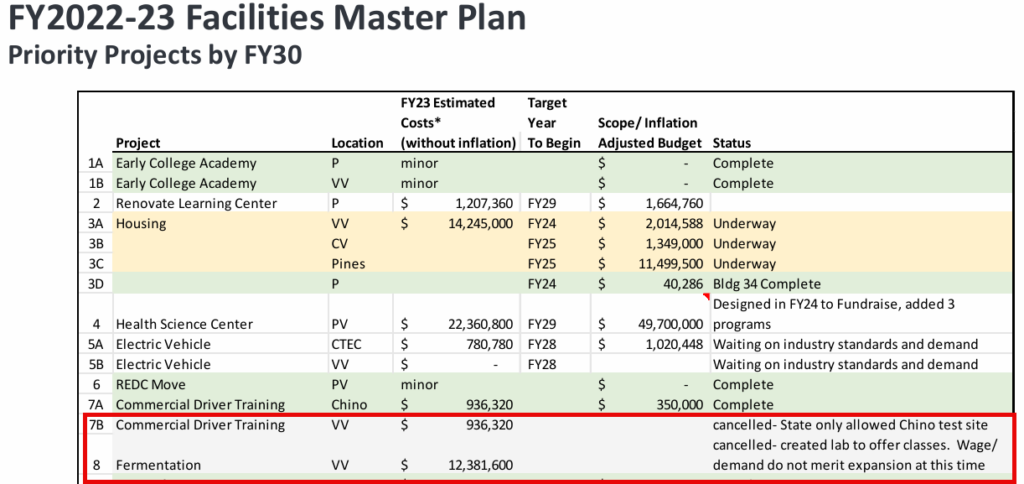
 On Thursday afternoon, February 6, 2025, members of the Yavapai Community College District Governing Board were notified via email that, due to unspecified “safety concerns,” future Board meetings would be held on Zoom. The notice stated that Chair McCasland “believes this will allow all meeting attendees, including the public, to participate in a safe setting.”
On Thursday afternoon, February 6, 2025, members of the Yavapai Community College District Governing Board were notified via email that, due to unspecified “safety concerns,” future Board meetings would be held on Zoom. The notice stated that Chair McCasland “believes this will allow all meeting attendees, including the public, to participate in a safe setting.”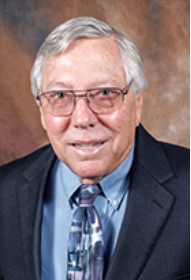
 It may have shocked some to learn that Yavapai Community College President Dr. Lisa Rhine has issued a chilling directive to staff, instructing them to never discuss college or community matters with a member of the District Governing Board. According to Dr. Rhine, even an innocent conversation with a Board member could lead to disciplinary action if it touches on something she considers and defines as “college operations.”
It may have shocked some to learn that Yavapai Community College President Dr. Lisa Rhine has issued a chilling directive to staff, instructing them to never discuss college or community matters with a member of the District Governing Board. According to Dr. Rhine, even an innocent conversation with a Board member could lead to disciplinary action if it touches on something she considers and defines as “college operations.” OPINION: The outgoing Yavapai Community College District Governing Board, with two lame-duck members, convened on November 21 at the Prescott Campus, where one of the major issues was a controversial resolution drafted by current consultant and former college president Dr. David Borofsky. The resolution’s main purpose appears aimed at stifling and controlling the free speech and behavior toward faculty and staff of elected Board members. As written, the resolution raises serious concerns about transparency and accountability.
OPINION: The outgoing Yavapai Community College District Governing Board, with two lame-duck members, convened on November 21 at the Prescott Campus, where one of the major issues was a controversial resolution drafted by current consultant and former college president Dr. David Borofsky. The resolution’s main purpose appears aimed at stifling and controlling the free speech and behavior toward faculty and staff of elected Board members. As written, the resolution raises serious concerns about transparency and accountability. Yavapai Community College pays $3,300 annually to participate in the Bellwether College Consortium, according to the organization’s website. This prestigious consortium recognizes outstanding and innovative programs among community colleges across the United States and its territories.
Yavapai Community College pays $3,300 annually to participate in the Bellwether College Consortium, according to the organization’s website. This prestigious consortium recognizes outstanding and innovative programs among community colleges across the United States and its territories.
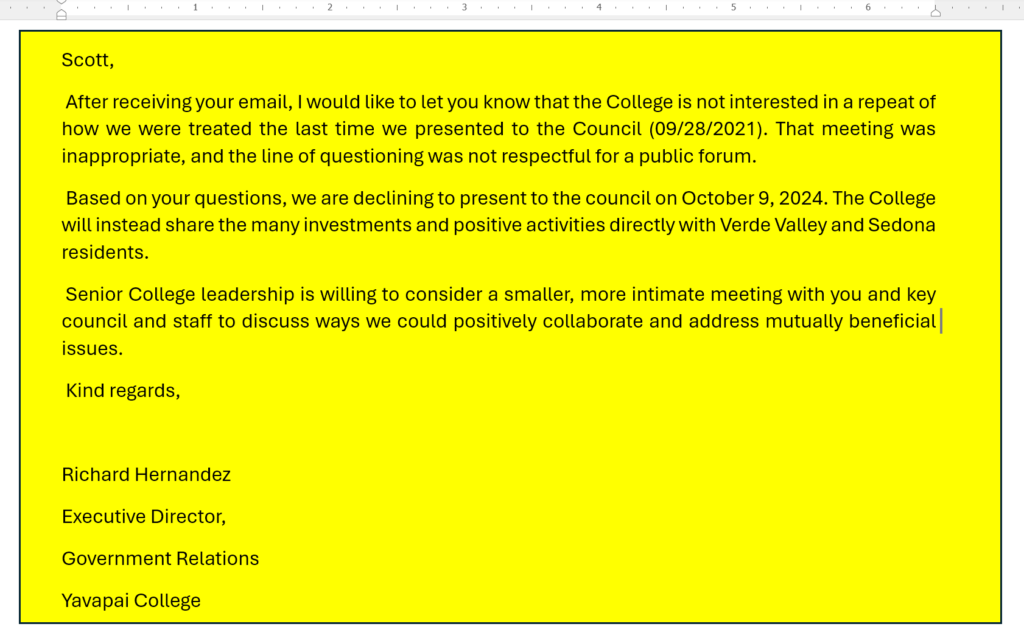

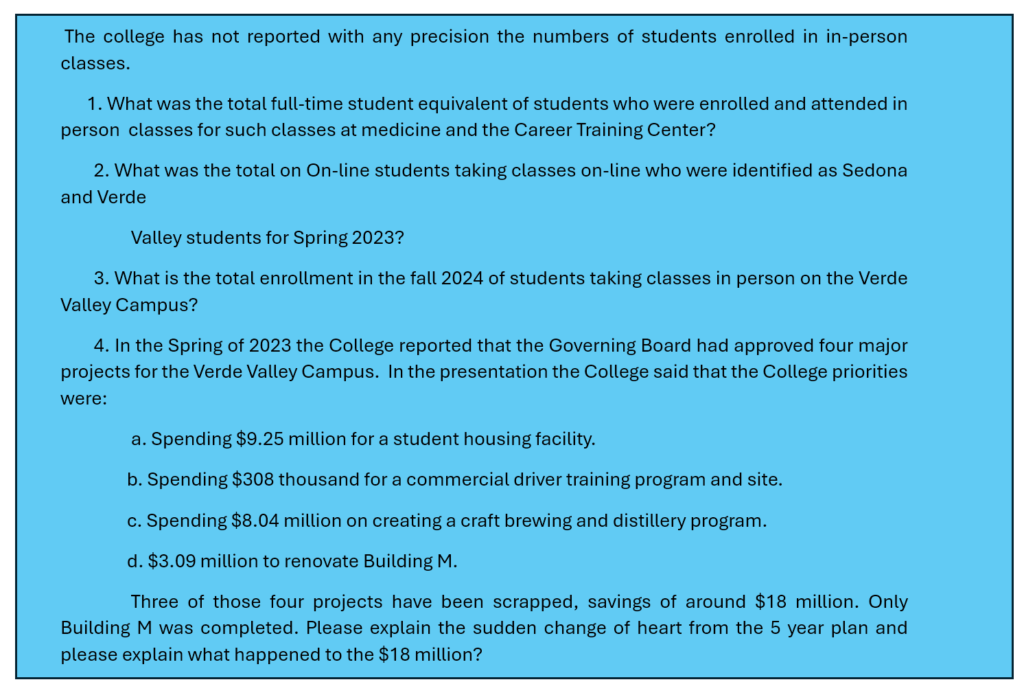
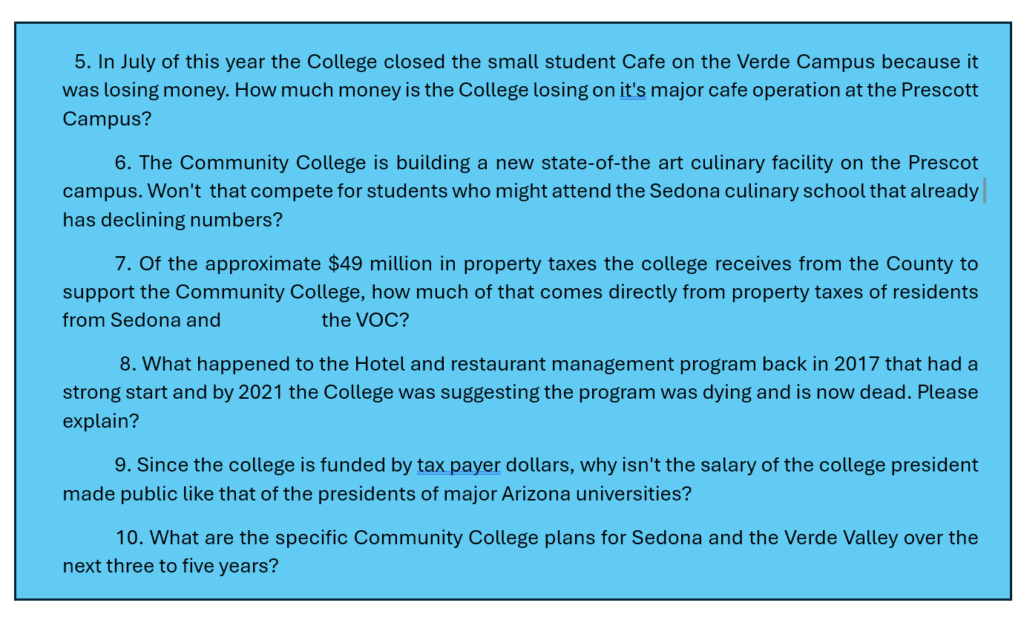
 The decision to close down the Student Café on the Verde Valley Campus was made by Yavapai Community College’s Prescott based Executive Leadership Team (ELT). The Yavapai Community College Sedona/Verde Valley Campus Dean is not formally included among this group of decision makers.
The decision to close down the Student Café on the Verde Valley Campus was made by Yavapai Community College’s Prescott based Executive Leadership Team (ELT). The Yavapai Community College Sedona/Verde Valley Campus Dean is not formally included among this group of decision makers.  Yavapai Community College was one of 153 companies across Arizona that were identified by AZCentral, USA Today Network, and LocalIQ as top workplaces and one of 22 organizations in the “large company” category. The Community College accepted the award at the annual Top Workplaces awards gala in Glendale, Arizona , on June 27, 2024.
Yavapai Community College was one of 153 companies across Arizona that were identified by AZCentral, USA Today Network, and LocalIQ as top workplaces and one of 22 organizations in the “large company” category. The Community College accepted the award at the annual Top Workplaces awards gala in Glendale, Arizona , on June 27, 2024.